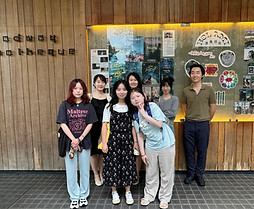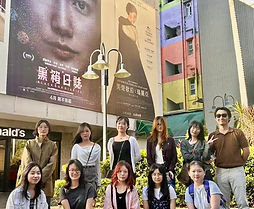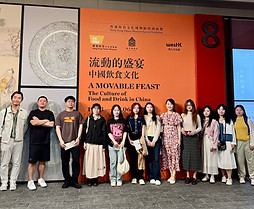
Students'
Activities

Movie Night: All We Imagine as Light
All We Imagine as Light is a poignant exploration of women's lives in Mumbai. The film intricately weaves the stories of two nurses—one grappling with an arranged marriage and the other navigating a disapproved romance—against a backdrop of societal expectations and personal aspirations. This powerful feminist narrative highlights the resilience and solidarity of women, showcasing their pursuit of autonomy and love amid patriarchal constraints. Additionally, the film engages with themes of political and social inequity, critiquing the societal structures that dictate personal choices. By portraying the characters' challenges within a city marked by economic disparity, the director underscores the intersection of gender, class, and power dynamics. As the story unfolds amidst monsoon rains and crowded trains, All We Imagine as Light invites audiences to reflect on the profound connections between women and the unseen battles they face in their quest for freedom and fulfilment.
"We watched many movies concerning female issues during this academic year. I like the discussion after each show, where we explored in depth gender issues like abortion, sexual minorities, and the plight of females. I’m glad to see girls and boys have constructive conversations rationally and critically; the education of philosophy enables us to tackle gender issues cooperatively."

Movie Night: Black Box Diaries
Black Box Diaries is a masterpiece that unpacks the deeply personal experiences of those navigating systemic challenges, societal expectations, and the pursuit of truth. At its heart, the film tells the story of survival, empowerment, and the courage it takes to speak out against injustice. It offers our MAPPE a chance to reflect on the systems that silence voices and how individuals can inspire change by stepping into their truth.
“Watching Black Box Diaries left me deeply reflecting on the burden placed on survivors to prove their pain. The film dedicates little time to the perpetrator; instead, it follows Shiori Ito’s long, painful journey through trauma and resistance. "

Hong Kong Palace Museum
On their recent visit to The Hong Kong Palace Museum, MAPPE students explored two exceptional exhibitions: A Movable Feast: The Culture of Food and Drink in China and The Forbidden City and The Palace of Versailles: China-France Cultural Encounters in the Seventeenth and Eighteenth Centuries. The first exhibition took students on a fascinating journey through five thousand years of Chinese food culture, highlighting how culinary traditions reflect deeper beliefs, social customs, and multicultural influences across dynasties, while interactive displays connected ancient practices to modern life. The second exhibition showcased the vibrant cultural exchanges between the Chinese and French courts, featuring art, science, and decorative treasures that illustrated the mutual curiosity and collaboration between the Forbidden City and Versailles. The visit offered MAPPE students an enriching perspective on how food, art, and diplomacy have shaped both Chinese society and its global connections, leaving a lasting impression of the depth and dynamism of cultural heritage.
"We are grateful to the PPE program for giving us the opportunity to visit the Hong Kong Palace Museum. The collision between modern architecture and traditional artifacts was truly breathtaking."

Movie Night: Joint Security Area
Park Chan-wook’s Joint Security Area is an essential watch for anyone interested in ethics, conflict studies, or East Asian geopolitics. Our MAPPE gathered for a special movie night and viewed the Joint Security Area together. Set in the Korean Demilitarized Zone, the film revolves around a fatal shooting that unravels a clandestine friendship between North and South Korean soldiers. While the plot hinges on a tense military investigation, its true power lies in its exploration of nationalism’s fragility when confronted with a shared humanity.
"The film asks: What defines an enemy? The soldiers’ bond—forged in whispered confessions and laughter—exposes borders as illusions. They exchange jokes and photos, thus subverting the dehumanizing rhetoric of their respective regimes, yet their tragedy proves how fragile their bond actually was."

Tai Kwun
Tai Kwun, a historic cultural landmark in Hong Kong, stands as a revitalized complex blending heritage, art, and community engagement. Once the Central Police Station, magistracy, and prison during British colonial rule, it has been transformed into a dynamic space for exhibitions and performances. Visiting Tai Kwun offers MAPPE students a unique academic lens to explore themes of governance, justice, and urban regeneration. By engaging with its exhibitions and architecture, MAPPE students gain insights into the interplay between historical memory and societal values.
"Walking through Tai Kwun, I was struck by the tension between its colonial past and its present identity as a space for creative freedom. The preserved prison cells, now hosting art installations, forced me to confront the paradox of repurposing sites of oppression into platforms for expression—a metaphor for Hong Kong’s own struggle to reconcile its history with its aspirations. "

Stanley
Stanley is a historic seaside town on Hong Kong Island’s southern peninsula. It is famed for its colonial-era architecture, vibrant markets, and scenic waterfront. For MAPPE students, Stanley serves as a microcosm for analyzing colonial legacies and economic transitions. Sites like the restored Murray House - a relic of British rule relocated brick-by-brick - offer tangible connections to Hong Kong’s colonial past and post-handover reinvention.
"I found myself reflecting on the layers of history embedded in Stanley's landscapes. The juxtaposition of the colonial-era buildings with the bustling market stalls painted a vivid picture of Hong Kong’s complex identity - caught between its colonial past and its modern aspirations."

Hong Kong Museum of Medical Sciences
Our MAPPE students visited the Hong Kong Museum of Medical Sciences to deepen their understanding of the intersection between medical history, public health, and ethics. Located in a beautifully preserved Edwardian-style building in Mid-Levels, the museum offers a fascinating glimpse into Hong Kong's medical past, occupying the site of the former Bacteriological Institute, built in 1906 to combat infectious diseases like the bubonic plague. Through its diverse exhibits, including displays on contagious diseases, traditional Chinese medicine, and modern medical advancements, the museum provided our students with an opportunity to explore how science, culture, and society have shaped healthcare in Hong Kong. The visit encouraged critical reflection on the ethical and societal implications of medical progress, reinforcing the connection between historical context and contemporary bioethical challenges.
"This visit deepened my understanding of how medical advancements are inseparable from the ethical and societal contexts in which they occur, making it clear that medicine is as much about navigating moral dilemmas as it is about combating disease."

M+ Museum
Our MAPPE students embark on an unforgettable journey to the renowned M+ museum. This exclusive opportunity is sure to ignite a sense of excitement and happiness among students as they delve into the captivating realm of art and culture. Imagine the smiles and eager faces of students as they explore the vast collections of art from Hong Kong, Mainland China, and Asia, discovering masterpieces in architecture, design, and moving images. This visit promises to not only enhance their knowledge of the arts but also to create lasting memories of joy and inspiration. Witness the thrill and delight on students' faces as they embrace this chance to experience the beauty and creativity housed within the walls of M+ museum.
"I’m very grateful to the Department of Philosophy for organizing this visit to M+. This visit has provided me with significant opportunities for reflection. The creation of art is intrinsically tied to the political and economic contexts of its time. By examining artworks from different historical periods and regions, one can uncover valuable insights into the socio-political and economic conditions of the artist. "

Hong Kong Palace Museum
To enrich students' knowledge of art and culture, MAPPE students explore the exquisite treasures at the Hong Kong Palace Museum. This exclusive opportunity let them delve into over 900 priceless artifacts from the renowned Palace Museum. Witness history come to life as many of these treasures are showcased in Hong Kong for the first time, offering a unique and immersive experience.
"The visit to the Hong Kong Palace Museum provided deep insights into the political culture of imperial China, especially the emperor's role as the Son of Heaven and the divine authority he wielded"
_trans.png)
